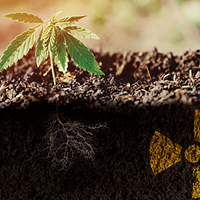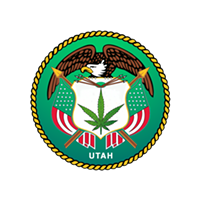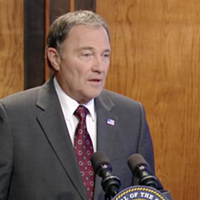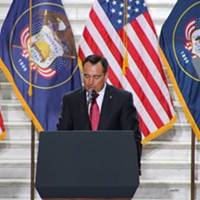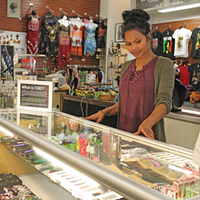
- Kimball Mortensen
But first, a glossary
Blunt—What you call a store-bought cigar where the tobacco has been dumped out and someone rolls it up again full of marijuana.
Bong—A device with water in its base, used to smoke marijuana.
Bud—The "nugs" you smoke after grinding. A mature marijuana plant's flower.
Cannabis—Used when referring to the plant used to produce hemp fiber and marijuana.
CBD—Also known as cannabidiol and can be used to treat symptoms of nausea, cancer, arthritis and other ailments.
Cotton Mouth—When your mouth gets dry after you get high. Try sucking on some candy.
Dispensary—Marijuana store that sells the drug in different forms, as well as paraphernalia.
Doobie—Another word for a joint.
Dab or Dabbing—Dab is a term used for smaller concentrates like hash oil or wax and when it is consumed, it is referred to as dabbing.
Glass—An informal term used to describe devices used to smoke marijuana, such as bongs or pipes.
Hemp—Comes from the same plant as marijuana and contains a small amount of THC. Can be used to make an array of products, including paper, food and fuel. Still federally banned, but states can be granted permission to grow it for commercial, research or development reasons.
Hydroponics—Soilless system of growing marijuana that often results in a better product.
Jazz Cabbage—Another slang term for marijuana not to be confused with a nearby professional basketball team.
Joint—Another word for doobie.
Kush—An indica strain of marijuana that gives users a relaxing, sedating high.
Mary Jane—A slang term for marijuana. Also a low-cut shoe style popular with girls in the early 20th century.
Medicinal—Refers to cannabis being used for medical reasons. Some states only have medicinal cannabis laws on the books and not recreational and medicinal.
Mota—Spanish slang for marijuana.
Piece—Slang term for a pipe or something similar used to smoke marijuana.
Pipe—A small hand-held device, usually made of glass, used to smoke marijuana.
Sativa/Indica/Ruderalis—The three cannabis classifications. Indica plants usually result in a more relaxing high, while sativa plants offer more cerebral, energetic effects. Ruderalis plants, meanwhile, are very high in CBD, which doesn't have psychoactive properties.
Schwag—Low-quality marijuana that's often brown and dry.
Spliff—Joint rolled with tobacco and marijuana.
Vaporizer—A smokeless method of consuming cannabis believed to be healthier than smoking.
Weed—Another slang term for marijuana, usually referencing the flowers of a cannabis plant.
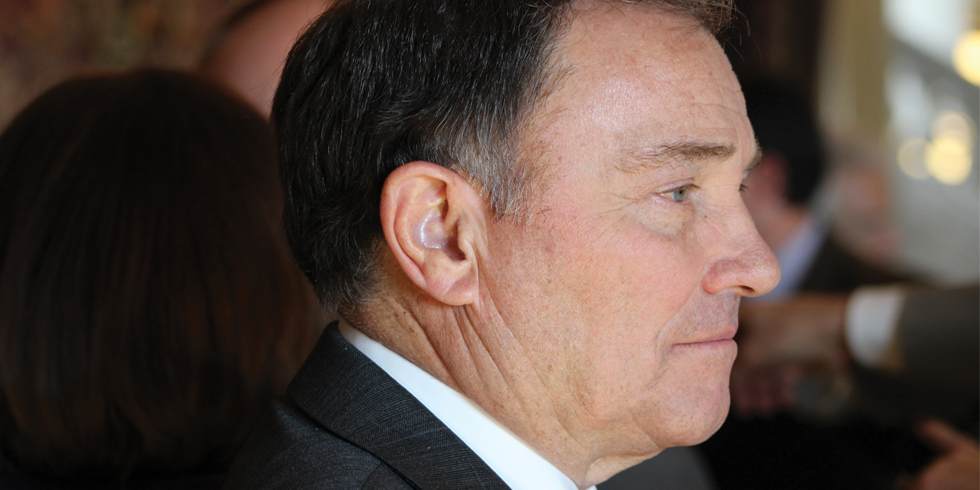
- Enrique Limón
- Gov. Gary Herbert
Having the Debate
Breaking dow the ballot initiative that could lead to medical cannabis it Utah.
By Kelan Lyons
Doc started smoking marijuana when he was 13 years old, around when a physician diagnosed him with attention deficit hyperactivity disorder. "It works better than that man-made 'speed,' or 'Ritalin,' as they call it," he says of the amphetamine commonly used to treat his condition.
Years later, cannabis has helped him manage Crohn's disease, a chronic, inflammatory bowel illness. He says cannabis also lowers his pain level, a constant concern since last year, when an SUV launched him into the air after hitting his motorcycle. "I'm not going to say it's magical and I can't feel nothing, because, yeah, I can still feel pain," he says. But it helps—and in his mind it's safer than pain pills.
Almost 39 years old, Doc, a Salt Lake City resident who declined to give his full name, has been using cannabis for medicinal purposes for so long that he knows how different delivery systems provide different forms of relief. Edibles and concentrates provide more body relief, he says, while smoking manages digestive problems. "I meditate and medicate," Doc says, summarizing the sui generis treatment plan.
Voters will decide in November whether to legalize some forms of Doc's preferred brand of medicine. If passed, Utah Proposition 2 would legalize medical cannabis for people who have certain qualifying illnesses including Crohn's, autism and post-traumatic stress disorder. Patients suffering from chronic pain also could be eligible if a physician determines they're at risk of addiction or overdose from opiate medications.
The initiative comes with a set of caveats. Patients would not be allowed to use cannabis products in public, barring a medical emergency. Also, dispensaries—facilities that prepare and sell medical cannabis—would not be allowed to sell cannabis in cigarette form, meaning patients could ingest it through delivery systems other than smoking—like lotions or balms.
Dispensaries would sell to card-holding patients, who would be authorized to buy a certain amount over a two-week period. The number of dispensaries in an area would be based on how many people live there—in Salt Lake County, that would be eight dispensaries, based on a 2017 population estimate by the U.S. Census Bureau. After Jan. 1, 2021, if a dispensary isn't within 100 miles of a patient's home, individuals would be able to grow up to six cannabis plants for personal, medical use.
“Utah doesn’t want recreational marijuana. The Utah Patients Coaltion ... we don’t want recreational marijuana. This was tailored for a conservative state, with Utah in mind.”
―Alex Iorg, Utah Patients Coalition campaign manager
If Prop 2 is approved, Utah would join the 30 other states that have legalized medical cannabis. The initiative is much broader than the "right to try" bill signed by Gov. Gary Herbert in March, which gives terminally ill patients with less than six months to live the option of using medical cannabis for relief.
"We may end up having two concurrent programs," Jack Wilbur, information and social marketing specialist for the Utah Department of Agriculture and Food, says, referring to the potential broader medical cannabis program and the rules UDAF is still writing for the narrow medical cannabis bill passed during the last legislative session. Lawmakers—or voters, through another ballot initiative— might have to find a legislative fix for the two simultaneously running programs, Wilbur notes.
UDAF does not have an official position on Prop 2, Wilbur says, but if it passes, "We believe it will add some work to our plate and slow things down."
Herbert has said he's against Prop 2 because he feels it has too many loopholes and could lead to recreational marijuana, given that some individuals could grow their own plants if they live far enough away from a dispensary. That, Herbert said during a recent monthly news briefing, means the state could "lose control."
Drug Safe Utah filed a lawsuit earlier in the year in an attempt to keep the proposition off the ballot, arguing that possessing marijuana is a crime because it's still illegal under federal law. The group dropped the lawsuit in early July, but KUER 90.1 FM reports the nonprofit could still sue in the fall should voters pass the initiative.
Also among the opposition are The Church of Jesus Christ of Latter-day Saints and the Utah Medical Association.
"... This initiative is not about medicine. Supporters have used images and stories of suffering patients to disguise their true aim: opening another market for their products and paving the way for recreational use of marijuana in Utah," a statement on the UMA website says.
Alex Iorg, campaign manager with the Utah Patients Coalition, the group leading the ballot initiative, calls Prop 2 "one of the most conservative medical bills that has ever been proposed in the nation.
"Utah doesn't want recreational marijuana. The Utah Patients Coalition ... we don't want recreational marijuana," Iorg says. "This was tailored for a conservative state, with Utah in mind."
Iorg says it's immoral to criminalize suffering patients who turn to medical cannabis. Conversations about treating debilitating illnesses, he adds, should be between doctors and their patients.
Although against the initiative, Herbert's public stance on medical cannabis has changed over the years. At a January 2016 news conference, he said he's "not interested in having Dr. Feelgood out there say, 'Yeah, yeah, ¿
qué pasa? You know, here's your doobie for the day and you'll feel better.'" Shifting gears, in April 2018 he said, "If marijuana can be used for medicine and alleviate pain and suffering, we've got to all be behind it," provided it's treated as a medicine, though he said he was uncomfortable because marijuana still is illegal under federal law. The following month, Herbert said ballot initiatives are a bad way to write laws, but he's open to having a conversation about medical cannabis. "Let's have the debate," he declared.
Doc says he helped gather signatures to get the initiative on the ballot, underscoring how important the medical cannabis program could be for people like him—those who are chronically sick or in pain. He's hoping it passes—a recent poll indicates two of every three voters in the state share his mindset—but he knows it's not a sure thing. "There's too many church folk in the government here who don't want to see it pass," he says.
"Because these people grew up on marijuana madness, they're scared their kids are gonna grow up and participate," the father of five continues. Although he gets around with a cane, Doc says cannabis helps him stand and allows him to be more present in the time he spends with his family.
"I don't smoke around my kids or anything like that," he says. "My kids know that cannabis is medicine."

- Rachelle Fernandez
- Utah Patients Coalition's Dave Karst, D.J. Schanz and Alex Iorg
High Time for a History Lesson
A brief, non-comprehensive history of U.S. hemp, CBD and cannabis laws. Like all great relationships, cannabis and the federal government have been on-again, off-again for years. Here are some highlights of the feds'—and Utah's—seedy entanglements.
By Kelan Lyons
Early 1600s: Virginia, Massachusetts and Connecticut colonies require farmers to grow hemp. Native Americans already had been cultivating hemp before American colonialists.
1830s: An Irish doctor figures out that cannabis extracts might help people suffering from cholera.
1900-1920s: Mexican immigrants bring marijuana with them to the U.S., introducing Americans to recreational use of the plant. Anti-Mexican prejudice leads to people attributing crime to marijuana-smoking immigrants.
1915: Utah prohibits marijuana two months after the LDS church does the same, making it the first state to outlaw cannabis. (Although some historians say California banned all forms of marijuana in 1913.)
1930s: The Great Depression hits, and public resentment and fear of Mexican immigrants leads to research linking marijuana with crime and violence.
1931: By this point, 29 states have outlawed cannabis.
1937: Marijuana is criminalized nationwide, thanks to the Marijuana Tax Act
1942: U.S. Deptartment of Agriculture encourages farmers to grow industrial hemp to prove their patriotism during WWII. The feds distribute 400,000 pounds of cannabis seeds to farmers across the U.S., from Wisconsin to Kentucky. Farmers wind up producing more than 40,000 tons of hemp fiber every year until 1946. Main campaign line: "Hemp For Victory." After the war, hemp becomes illegal again.
1970: The Controlled Substances Act is signed into law by President Richard Nixon, listing marijuana as a Schedule I drug, along with heroin and LSD. Effects of this are still felt today, as the federal government considers drugs in this classification to have no medical value.
1972: The National Commission on Marihuana and Drug Abuse releases a report recommending more-lenient penalties for possessing small amounts and encouraging scaling back full prohibition of the drug. Nixon ignores it.
1996: California becomes the first state to legalize medical marijuana for people suffering from chronic or severe illnesses.
2012: Washington State and Colorado become the first states to legalize the recreational use of marijuana.
2017: Attorney General Jeff Sessions—who once said, "I thought those guys [the KKK] were OK until I learned they smoked pot"— becomes attorney general in the Trump Administration.
2018: Utah legislators pass bills that allow selling CBD products and the cultivating, processing and marketing of industrial hemp products. Terminally ill patients who have six months left to live also will have a "right to try" cannabis-based treatment.
November 2018: Voters will decide whether medical cannabis—oil, edibles and vaping, not smoking—will become legal in Utah.

- Courtesy Mark Madsen
- Mark Madsen, pictured in white, tours the Andes ahead of moving to Peru to start a medical cannabis business.
It's a Mad, Madsen World
Two years after retiring from the Legislature, former Sen. Mark Madsen is finally ready to leave the country.
By Ray Howze
More than two years after Utah Sen. Mark Madsen retired from the Legislature, he's finally ready to pack up and move on.
During those 24-plus months of life outside the public sphere, the former senator has been busy. By the end of the month, he will make good on his promise to move his family to Peru.
In Madsen's final year as a senator, he mounted a fierce fight to pass his whole-plant medical cannabis bill. It failed, perhaps not surprising to Utahns who have watched lawmakers debate the issue for years. It's also one reason the ballot initiative for medical cannabis will be decided by voters come November. After Madsen's failed effort, though, he told local news media he was ready to leave and felt Utah was "not welcoming to people who want to live their lives and be free to make choices for themselves."
City Weekly caught up with Madsen to learn what he's been up to before he heads to South America. Preparing to move to a foreign country hasn't been quick, Madsen says. He will be running a medical cannabis business once everything is approved in Peru.
"The legislation has passed, the rule-making and public comments are going to be over in mid-August," Madsen says. "The political leadership and the environment is completely different. All of South America is going this direction."
Madsen isn't wrong. South America, in general, is becoming more welcoming to legal uses of marijuana. According to a report released by Arcview Market Research in partnership with BDS Analytics earlier this year, legal marijuana sales on the continent are expected to go from $125 million this year to $776 million by 2027.
Madsen says the family has purchased property near a beach in Lima, Peru, and are looking forward to the next chapter in their lives. The Columbine, Colo., native admits Utah was never a final destination, though he did remain here longer than expected. After moving here to attend law school, the BYU grad ended up "falling back into local politics" and served as a state senator from 2005-16.
As a self-described Libertarian, Madsen says he's looking forward to Peru's way of life and the "more freedoms" he'll enjoy. Not to mention, the opportunity to use medical cannabis to treat his chronic pain.
Far from looking ahead to lazy afternoons on the lido deck, Madsen says he's ready for his new role as medical cannabis advocate. After his senate career, Madsen traveled to Peru with friends and family and while in the Andes, he suffered from altitude sickness. He says he was able to smoke some medical cannabis to settle his stomach and felt better. But following the trip, he started getting more calls and text messages from colleagues that told him people in Peru were looking for someone who could help with the medical cannabis approval process in the country. That's when Madsen says plans to move there really started to pick up.
"It's a different marketplace; they don't even sell opioids," he says about his new home. "They have no market alternative, really, other than alcohol. We've met with the department of health down there ... the substitute [for pain medication] is alcohol and we know from history that alcohol numbs the pain, but we've got people down there that are drinking themselves to sleep every night so they're very eager to see how making medical cannabis offsets the alcohol use."
In Utah, Madsen says he found himself butting heads with other Republicans at times, especially when it came to The Church of Jesus Christ of Latter-day Saints, of which he still is a "1,000-percent church-going Mormon." He learned as early as his first year in the Legislature what it would be like to work with the church's lobbyists. As a legislator, he says, he never had a chance to talk to high-ranking LDS officials. Instead, "it's always filtered through someone else, at least when you're coming from my political perspective."
Whether the issue was about gun rights, immigration or even cannabis, he says he wishes the church would be "consistent in applying its principles." For example, he points out the church frequently says it needs to show compassion when regarding immigration and keeping families together, but "all those principles seem to get lost when it comes to [cannabis] patients."
"I butted heads with the church on a lot of things," Madsen says. "When I say 'the church,' I really want to be clear—I don't say a word against the ordained authorities of the church or the apostles, but the fact of the matter is, none of them ever bothered to come and talk to a lowly state senator, I always met with their front people—the bureaucracy.
"I was never able to have a substantive conversation with anyone in authority or anyone ordained, so I had no idea what their positions were on these issues."
Carl Wimmer, another fellow legislator who not only left Capitol Hill but the church, too, says he sees some similarities between himself and Madsen. The two, both Republicans, worked on various pieces of legislation together including gun rights and bills tightening laws on sex offenders. Wimmer called Madsen a "good, good person and a great senator."
"The fact is that at the end of his political career, Mark was burned by his own church leaders," Wimmer says. "He was told multiple times they would not come out publicly and oppose him or fight him in his efforts toward legalization of medical cannabis and that simply didn't happen—they came out and they torched his legislation multiple times."
Another former legislator, Steve Urquhart, worked closely with Madsen on the medical cannabis bill. Like Madsen, he retired from the Legislature in 2016, citing conflicts with lobbyists and the LDS church. Urquhart has since publicly stated he didn't like how the church acts at times in "surreptitious manners" to kill legislation. However, he says, he has faith in Utah voters come November.
"At the end of the day, Mark is going to have his victory and he should be proud of the role he's had," he says. "The public is going to pass it and the only opposition, really, is the church and UMA—but it's just the church. Everyone it can convince to vote against it, it already has convinced."
Since retiring from public service, Madsen has spent his time between Utah and Portland, Ore. In Portland, he can access medical marijuana. His wife, Erin, says she also has become a strong proponent of the drug, even though she doesn't use it herself. She would like others to have the option to use it, such as her mom who died of cancer a few years ago. Her mother instead had to rely on fentanyl and morphine.
"One of our best doctors said, 'What I love about cannabis is there are a lot of different ways you can use it and as doctors, we often say we need another tool in the toolbox. What I love about cannabis is it's a Leatherman,'" Erin Madsen recalls. "What I like about cannabis is you can use it as a patch; it doesn't need fat to metabolize. It goes through your veins, so as long as your blood is circulating, you can use a patch."
Madsen urges Utahns to read the Proposition 2's text before they vote in November. He says he worries about other types of information published by groups such as the Utah Medical Association or the list of "legal issues" published by the LDS church's law firm of Kirton McConkie. The initiative, he says, is "only 22 pages," while other publications, such as Libertas Utah's response to the Kirton McConkie piece is "as long as 44 pages."
"Reading the initiative is so important," Madsen underscores. "I believe people are smart enough to figure this out themselves ... It's written oddly because it's law, but I believe 98 percent of the people in Utah are smart enough to read that thing for themselves and they can come to their own conclusions."

- Angela Bacca
Medical Marijuana Refugees
People are leaving Utah for states where marijuana is legal. Here are stories from four ex-Utahns who've had to pack up their possessions just to get the medicine they need.
As told to Rich Kane
Angela Bacca, 32, was diagnosed with Crohn's disease in her teens. She lived in Salt Lake City while her husband was attending grad school and now lives in Portland, Ore.
I was born in California, where medical marijuana has been legal since I was 10 years old, so it was always in my mind that sick people use marijuana. There was never any question. I didn't know what it was like to live outside of California and use cannabis as medicine. Then I moved to Utah.
While in Utah, I was also editing a cannabis magazine in Berkeley, so I would commute to California once a month. I had a caregiver in California and got cannabis there, then would pick up what other people in Utah needed and smuggle it in. That got to be too much after a while. I was never arrested, but I was very, very paranoid every time I would return to Utah.
I looked up all the laws of the states I was driving in and out of. Even if you drive between two states where it's legal, like from Oregon to California or Washington, you're breaking federal interstate trafficking law, which is five to 15 years in prison. I didn't think I would be a target for anyone to go after because I have Crohn's and I'm not profiting myself; I was bringing it in for other seriously ill people. The fact that I had to worry about these things when I was just trying to not be in pain is so absurd. It's not fair that anyone has to continue suffering anywhere when it's not necessary.
The situation is not going to stop until we actually give people full, unimpeded, safe access to the cannabis they need. People won't stop moving to marijuana-friendly states until that happens. It will be many years before we understand the full impact that moving has had on economies, on families, on medicine itself. We've displaced a lot of people in order to preserve people's profits.

- Katherine Searle
Katherine Searle, 32 moved from Vernal to Oregon in March 2017 so her 15-year-old daughter Raeleigh can legally use medical marijuana to help cope with injuries she suffered in a near-fatal ATV accident.
I was born in Utah and lived there most of my adult life. It sucked to leave because it was my home and my kid's home.
My daughter sustained a traumatic brain injury as well as a plethora of internal injuries from the accident. Her right arm was almost amputated. Her entire body was beat up. She has a lot of nerve pain, severe headaches and some cognitive deficits as well. She lost her right kidney and can't take a lot of traditional medications, and that's further complicated by her brain injury because that's in her frontal lobe and makes her more susceptible to addiction.
In order to manage her pain, she takes a 1:1 ratio of CBD oil with THC and that's illegal in Utah. We started her on it when we still lived in Utah just to see if it would help, and there were immediate results. It takes away her pain completely. It increases her appetite and thirst to where she can get enough calories and drink enough water—she's often dehydrated with her kidney problems. It also helps her mental clarity when she's doing homework. With the brain injury, she has some learning issues, but then she'll take her oil and she's able to really focus. She had a major headache last night, took some oil, and it went away. It's kind of a miracle.
Here in Oregon, when she runs out of oil I just go buy her more. We always notify doctors that she will fail a drug test because she'll test positive for THC, but that's not a big deal here. I don't face going to jail or losing my kids to the state and everything else Utah parents face, which is terribly frightening. And in Utah, there's still a lot of ignorance by people who assume that if you take CBD oil, you're a druggie. It's ridiculous.
I do hope for the sake of Utahns and especially patients that the ballot initiative is passed. It's very frustrating when people don't realize how their vote affects real people and real children in their own community. Personally, I would never move back to Utah. Marijuana is just one of the many issues there I disagree with.
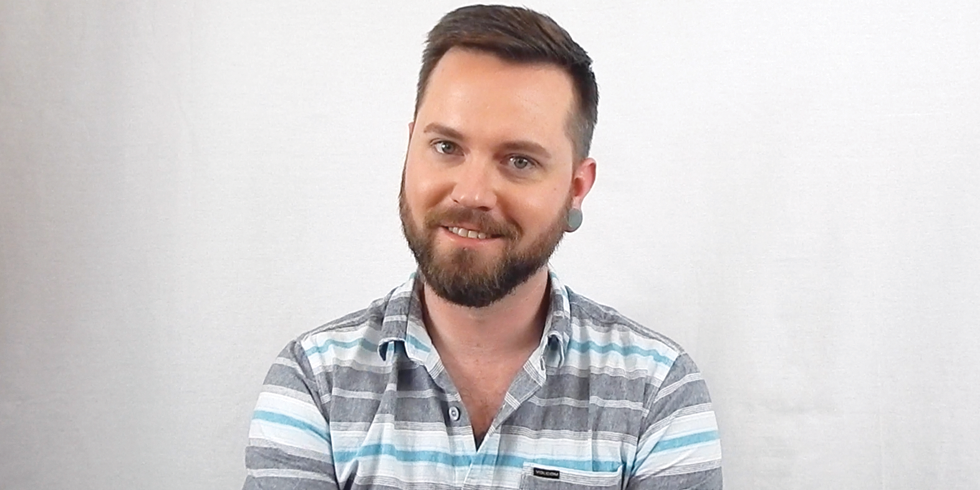
- Rory Kalmar
Rory Kalmar, 35, lived his entire life in Utah until June 2017, when he and his husband moved to Santa Rosa, Calif., to get the medical marijuana he needs to cope with back pain.
I had back issues as long as I can remember, but I was able to maintain a job and not have much of a problem. Then about five years ago, I had a work injury, and that's when things started to get more complicated. Doctors started me on an opioid path with prescriptions, but I didn't like how they made me feel, and they were highly addictive.
Marijuana was the best way to take care of my pain management without being zonked-out from the pain pills. It doesn't completely get rid of the pain, but it lets me function. When I was on a pain scale of 10, it would bring it down to a 5, to where I could manage daily tasks. The combination of CBD and THC is what's keeping me mobile the most. Marijuana has been extremely beneficial and my quality of life wouldn't be the same without it.
I was using THC in Utah and I would take whatever I could get. But if I needed a particular strain with certain terpenes that would allow a specific benefit to me, I couldn't go searching that out. Not all terpenes have the same benefits.
Another reason we moved to California was to work with a company that does medical marijuana as well, Happy Roots. It was started by one of my friends from Utah. We were basically a tight group of DJs and one of our friends had gotten AIDS, so another one of us started this business basically for him. She would make him edible candies to help with his pain.
We have specific products for which the proceeds will go toward helping HIV and AIDS patients. Even though there are a lot of dispensaries here that are going recreational, we're in it for people with medical needs. If it helps me this much, then I want to help others get out of pain as well.
It's really expensive to live in California and there are a million reasons why I would still like to be in Utah. I was sad to leave. I miss my friends and family. There are so many people there who are in the exact same situation as me, who want the same kind of relief. They're just not willing to uproot their lives over it.
I'm letting all my Utah family know to vote yes on medical marijuana, and I think it will pass. Utah was the main reason same-sex marriage became legal across the nation, and that was crazy, so if that can happen, anything can.
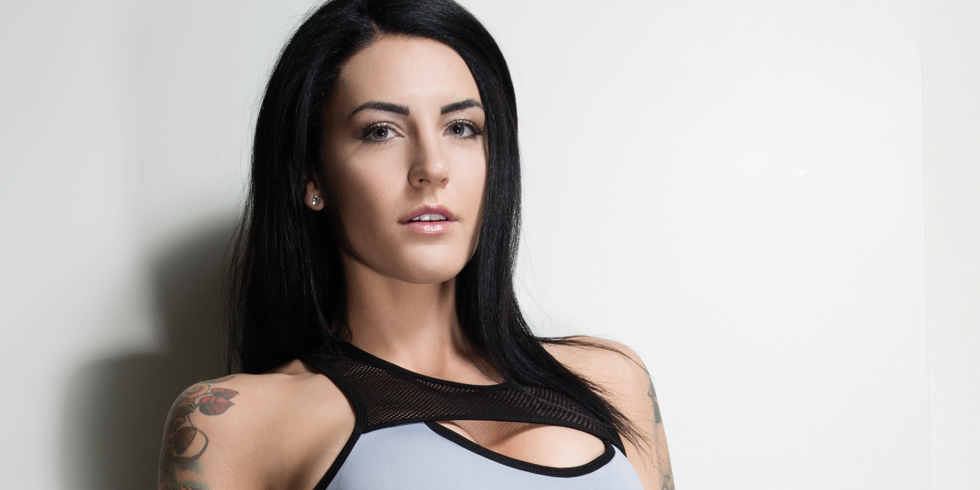
- Dallas Sainsbury
Dallas Sainsbury, 25, went to the University of Utah and lived in Salt Lake City for seven years. She moved to Colorado partly so she could use legal marijuana to help treat her Crohn's disease.
Here in Telluride, there are more dispensaries than there are liquor stores. Every time I go in to one, there's somebody getting medication.
I was diagnosed with Crohn's when I was nine years old. It was in remission for a long time until 2015, when I had a really bad flare-up that left me bedridden or in the hospital for about eight months. I was getting sicker and sicker and we were running out of options, so I asked my doctor about cannabis. He said he didn't know any other options I had, and to pursue it if I wanted.
I've used marijuana both recreationally and medically and it's never been something I've had withdrawals or bad side effects from, whereas oxycodone and Dilaudid are so terrible for you. Those drugs help with pain but they make the symptoms worse.
With cannabis, I would wake up in the morning, use a vaporizer, smoke that and instantly feel better, good enough to where I could get out of bed and function. Cannabis has allowed me to get off some of the medication I was on and ultimately kept me off a feeding tube, because I was completely unable to eat without severe pain.
I'm an ex-Mormon. Most of my family is very LDS and they're all in complete support. My mom wasn't at first; then she saw first-hand how much it helps me. A lot of Mormons are in favor of Proposition 2, and in states that have it legalized, you can still hold a temple recommend and use it as a medication, so the church is kind of shooting themselves in the foot when they speak against it.
I think it will pass. It's going to help a lot of people.
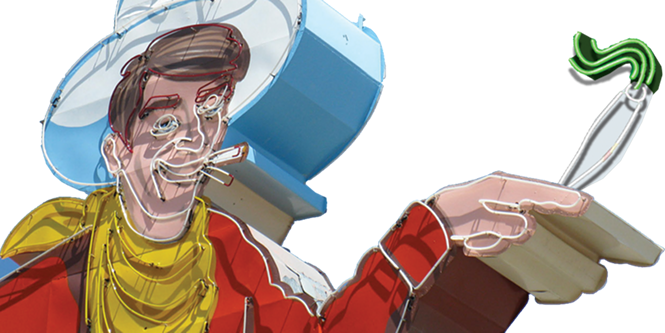
- Derek Carlisle
- “I see marijuana as one of those industries that could pick up that slack if and when there is another downturn in the economy.” —West Wendover Mayor, Daniel Corona
The Green Mile
Just 90 minutes west of Salt Lake City, the town of West Wendover grapples with Nevada's recreational marijuana option.
By Ray Howze
Legal recreational marijuana could soon be closer than ever to Wasatch Front residents.
Wait, what? Yes, Utahns could soon be within a 90-minute drive for access to the sticky green—and it would be legal. It would also be closer than options in Colorado, Mesquite and Ely, Nev.—about a four- to six-hour drive away depending on where you live.
Many residents in Salt Lake City might think of West Wendover as an overnight or weekend getaway for live entertainment and gambling. For years, it's been the closest option for Utahns to take in some of Nevada's enticements like casinos and cheap booze. But it could soon be home to another illicit (in the eyes of the Beehive State) temptation.
Since Nevada voters approved recreational marijuana in 2016, West Wendover's city council has debated how to establish the burgeoning industry. The city already has approved medical cannabis and the company Deep Roots Harvest, which also operates in Mesquite, is setting up a medical operation in West Wendover. In May, the council approved a wholesale grow option and in early July it approved selling 10 acres in its industrial park to BRLS NV Properties, LLC, which eventually will grow and ship marijuana to dispensaries throughout Nevada.
But commercially available to the general public? And perhaps to those visiting from Utah? Not quite yet.
Unlike Utah's other border town with Nevada—Mesquite, which jumped right into recreational sales—West Wendover has been a bit slower.
West Wendover City Councilman Gerald Anderson tells City Weekly he's wanted to go about approving marijuana in a "controlled manner" from the beginning.
"There are naturally some on the council that want to get it going and have it on every corner and there are others—I am one of them—that want to go in a manner that we settled on when we first started this thing, and that is to go with medical marijuana and get that set up first," Henderson says. "In the future, we'll vote on recreational."
He says he's not against the recreational option, but would like to see the medical distribution take hold first.
In April, the council rejected a recreational marijuana ordinance. The vote was 3-2 with Anderson as one of the three members voting nay. However, the city's mayor, Daniel Corona, vetoed what he called a "rash" decision.
"The motion that was made was very broad—it was to not allow any recreational marijuana," Corona says. "To me, if that would have stood, I don't think council would have been able to approve wholesale [marijuana] at the next meeting—I don't think the motion was very thought out and I wanted to leave that door open because it was such a broad issue."
While Corona is not up for re-election this year, he notes that because there is an election this November, the recreational question could be raised again as soon as 2019, depending on if any city council seats change. Three council members out of five—Ismael Gutierrez, John Hanson and Jasie Holm—are up for re-election.
One of Corona's goals has been to find new ways to diversify the city's economy because it "is very reliant on the casino industry," he says.
"It's kind of a double-edged sword because we wouldn't be here without them, but as we saw in 2008 when the economy went bad, the first thing people cut out of their personal budgets is the fun things," Corona says. "So they don't have that extra money to come out here and people lose jobs—we want to be sure that we have a strong economy ... that if something does happen, we have other industries that can pick up the slack. I see marijuana as one of those industries."
Corona, and others on the council, say they also recognize the impact recreational sales could have on Utah. Many residents of Wendover, Utah, for example, work on the Nevada side.
While "anything good that happens on either side of the border is good for the community," Corona says, he has also heard concerns from the Utah side's mayor about legalizing pot.
"Obviously, we want to discourage people from transporting marijuana across state lines because that is still federally illegal," Corona says. "But also, we need to find a responsible way for folks that come out to West Wendover and if they decide to go to a dispensary and purchase marijuana, we need to give them a place they can use it safely so there is no excuse for them to transport it across state lines."
A lot of factors come into play when it comes to Wendover, the councilmembers and the mayor admit. For example, if those who work in the gaming industry must be drug tested, using marijuana would eliminate that job option. Additionally, because of Nevada's laws, residents who don't live within 25 miles of a dispensary are allowed to home-grow up to six plants. Once a dispensary opens, however, residents within that periphery would need to stop.
Councilwoman Jasie Holm has advocated for a recreational option. As an owner of a catering business, she says she looks at the debate from a business perspective, but says the council hasn't been very "business friendly" on the topic.
"I'm for it, but the criteria that [Deep Roots Harvest] have to go through to build this new establishment without having recreational sales doesn't make sense to me," she says. "If you open an oil-changing place and you can't change oil but you can only balance tires, it doesn't make sense—recreational sales are where they're going to make their money."
Holm also says she would like to see the city keep pace with other Nevada cities.
"I think it's already so established, I even feel we're behind the times," she says. "It's not like we're taking any leadership role in it—it's common sense to me."
In his letter to the city council in April, Corona wrote if the city's numbers end up being similar to Mesquite's, it could add as much as half-a-million dollars to the city's revenues. He also proposed the idea of using funds for youth-prevention programs and other counseling options.
While not available to the general public yet—and as Utah residents vote on a medical option this November— locals will surely keep an eye on developments in West Wendover.
"At the end of the day, it's something that will help both sides of the community, employ people from both sides of the community and both sides will see benefits from it," Corona concludes.
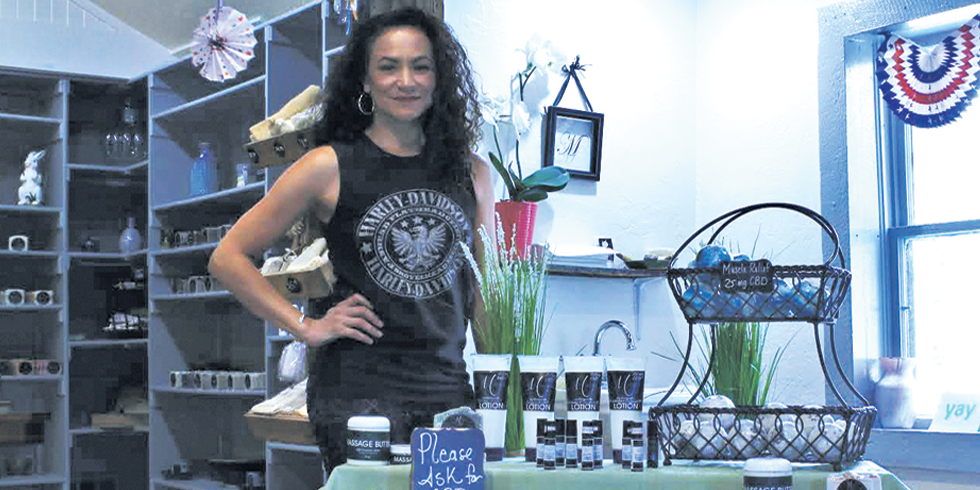
- Jordan Floyd
- Daniella Lucero helps make and sell CBD-infused bath products.
Rub-a-dub-bud
Boutique operation brings CBD-infused bath products from West Jordan to the world.
By Jordan Floyd
Outside the M Soaps by Marguerite shop in Gardner Village, on a brick pathway the shop shares with a boutique that sells "Utah's largest assortment of 18-inch dolls" and another that offers all things posh and pretty, sits a chalkboard sign that reads: soaps, bath bombs, CBD and more.
Ostensibly, the lone acronym on the list is easy to miss, especially since it's paired with words that evoke thoughts of a Technicolor bubble bath—and more, whatever colorful, fragrant wonder that might imply. To any passerby who's clued-in on cannabis knowledge, however, the fact that M Soaps sells products infused with cannabidiol (CBD), a compound extracted from a particular strain of the cannabis plant, in the heart of suburban Salt Lake is enough to stir any Utahns' spirit.
Marguerite Blakey has made soaps for 17 years. Only recently did she begin to sell soap products, as well as lotions, bath bombs and oils infused with CBD. The inception of M Soaps' CBD products happened at the intersection of her daughter Daniella Lucero's discovery of topical CBD treatment and the long-standing soap business.
Following a motorcycle accident and subsequent surgeries, Lucero says doctors "basically handed [her] a lifetime prescription for Tramadol," an opioid used to treat moderate to severe pain. Firmly, Lucero declined the prescription and began using a CBD tincture that she applied to the affected areas in conjunction with physical therapy. It was at this point that she asked her mother to send her some of her lotions, which Lucero then began mixing with CBD.
Now, for the past 19 months, the mother-daughter team has sold CBD products, like those Lucero concocted on her own, at the West Jordan shop.
Situated in a nearly 150-year-old cabin, parts of which were transported to Gardner Village from Utah's Rush Valley, M Soaps is surrounded by myriad shops that epitomize the state's family-friendly (and at times lavish-to-a-fault) boutique culture. The shop capitalizes on that very same culture, offering all that's en vogue in artisanal bath and body care, with a twist. The way the retailer fits into the aesthetic and modus operandi of Gardner Village, Lucero says, makes her CBD products more palatable, particularly for patrons who might not try or even come near CBD products otherwise.
"A lot of people chuckle and laugh when they find out where we are at," Lucero says. She notes, however, that those who frequent or wander into M Soaps aren't shocked or uneasy by the sight of something like a 4-foot tall bong or any other paraphernalia that might worry the average Utahn. "We are actually filling a void for a demographic that has heard about [CBD] and is interested in it, but that can't find it at Smiths, or can't find it at Whole Foods," she says.
Although the shop's CBD products do not play directly into the current debate over medical marijuana in Utah (CBD, for the most part, is legal in most states and has the chance of becoming ubiquitously legal, should Sen. Mitch McConnell's Hemp Farming Bill of 2018 succeed), they have a role by familial association, so to speak. As Lucero says, "[CBD] just looks like its cooler cousin; it's not its cooler cousin."
Perhaps it's M Soaps' palatability, both in the way it exists as a family-friendly shop and in the way it sells products that makes it a player in the push to legalize and normalize cannabis products in Utah. Although it currently serves a narrow demographic of shoppers who want to ease pain or anxiety, or those who simply want a fragrant bath bomb with the topical benefits of CBD, M Soaps' clientelle is growing. And so, too, the support for cannabis in Utah, with each pump of their CBD-infused Lavender and turquoise lotion or slather of pain-relieving massage butter.
"It's happening," Lucero says, especially as larger companies continue to come to Utah, bringing with them a workforce with needs different than those of homegrown workers. In particular, Lucero points to Lehi and its Porsche dealership, a place she and her friends used to ride dirt bikes. To her, it's evidence that the culture and demographic of the Salt Lake Valley, its bordering cities and beyond, are morphing toward the progressive.
"The landscape is changing," she muses. "With that fresh blood that's coming into the valley, things are going to change whether [Utahns] like it or not—these people vote, too."
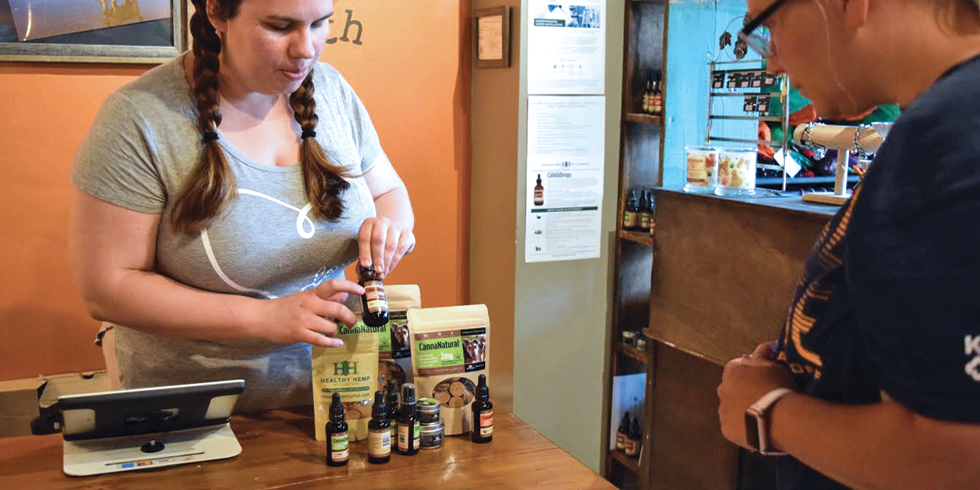
- Ray Howze
- Aspen Anderson, left, explains the the properties of CBD products to pet owner Lindsey Hazelwood.
Cannabis for Canines
Following a potential crackdown from the state's agriculture department, pet stores find new way to sell SBD products.
By Ray Howze
Lindsey Hazelwood's dog gets anxious when she and the family leave the house. The 4-year-old husky whines and chews things it shouldn't in an attempt to escape.
Hazelwood hasn't yet found something that helps calm the dog down. After a visit to a local pet store last week, though, she hopes some cannabidiol, also known as CBD, will do the trick.
"Our friends have suggested it but we haven't tried it yet," Hazelwood says. "[The dog] freaks out whenever we leave; she digs holes and chews the wood in our house trying to get out."
So after discussing ways to give her dog cannabidiol—either via a biscuit or oil—she purchased a small bottle of the latter to try out. The product is one of a number manufactured by Park City-based Healthy Hemp and can be found in stores around the valley. The company's CBD pet products are used to treat arthritis, anxiety and nausea—some of the same reasons humans consume CBD, among others. Hemp oil is an active ingredient.
The items come in oil or a balm or in an edible, treat-like snack. However, nearly a year ago, the products almost were pulled from shelves.
In August 2017, Utah's Department of Agriculture and Food issued warnings to more than two dozen businesses regarding sales of CBD products intended for animal use.
The letter at the time asked for "voluntary compliance in recalling previously distributed products and refraining from future sales of hemp and hemp products in the state of Utah."
But almost a year later, consumers can still purchase the products for their best friends, thanks to a little creative labeling.
Mark Ashcroft, the department's feed-program manager, tells City Weekly that any hemp or cannabis-type products previously were illegal because they were not approved by the Food and Drug Administration and the Association of American Feed Control Officials—a voluntary membership association to which Utah belongs and regulates the sale and distribution of animal feeds.
"There were a couple businesses that went in and changed their labeling," Ashcroft says. "They took out any feed-related terms ... there were words like 'treats' and 'biscuits' and stuff like that that made it appear as a nutritional item and that took them out of our jurisdiction because they were then not marketing it as an animal food."
As a result, the products now fall under the jurisdiction of the FDA, according to the agriculture agency, and sort of operate in a gray area. Instead of labeling the products with words like "biscuit" or "treat," the food packages say "Cannanatural" and instead of CBD, they say "Phytocannabinoid Rich Hemp Oil," PCR for short.
The products are also gaining popularity among consumers, according to various pet shop owners. Aspen Anderson, who owns Desert Raw Holistic Pet in Foothill Village, says that while the agriculture departmen issued her store a warning last year, she never was forced to pull the products off the shelves.
"It's within my top three brands," Anderson says. "I sell more of it than most of the other products."
Anderson sold Hazelwood the bottle of CBD oil and encouraged her to try it out on other treats if the dog didn't like the taste.
Lori Young owns Pet Wants in Sandy and also manufactures a CBD salve for Healthy Hemp. Young, like Anderson, was given a warning by the agriculture department about the products.
"It was only a suggestion—they weren't forcing us to [remove the product]," Young says. "I responded back to them as the manufacturer: 'Knowing what this product is capable of doing, I will not be removing this product from my store shelves.'"
About six months later, she received a follow-up letter saying the retailer had followed all the rules and that there was "absolutely no reason to remove it from the shelves."
Melissa Ure, a department policy analyst and hearing officer, says the products now are seen as a drug and don't fall under the UDAF's purview.
"I think most of the owners who are selling it are aware of it, it's not an approved drug by the FDA," Ure says. "The FDA could come in if they want to and enforce that—currently they are not—but it doesn't mean they won't."
Young says that while the action made some people think the products were illegal, their sales still "went crazy" and she used it as an opportunity to educate her customers about CBD. That feeling of a crackdown has since subsided. However, as Healthy Hemp's owner Dave Merrell points out, there still are other hurdles running a hemp business.
"Our biggest hurdle is education" Merrell says. "That No. 1, this stuff works, and No. 2, are we legal or not legal?"
Once hemp is classified as a crop by the state, he says, their credit card processing fees will also go down. Fees are high today because the industry is deemed as high-risk by many brokers.
Meanwhile, the agriculture department, which now is tasked with implementing the state's hemp and medical cannabis bills it passed in the last legislative session, is currently trying to figure out how to address the issue of using CBD in animal feed.
The department had scheduled a meeting with the Natural Resources, Agriculture and Environment Interim Committee committee on July 18, but they ran out of time and postponed the discussion.
"We're kind of in a, 'We're going to let the FDA handle the drug part of it,' mode," Ure concludes. "What becomes a problem right now, with the laws that just passed regarding CBD being available for humans ... we're kind of in this gray area for animal feed and it's going to take some legislation to correct that in some way or another."
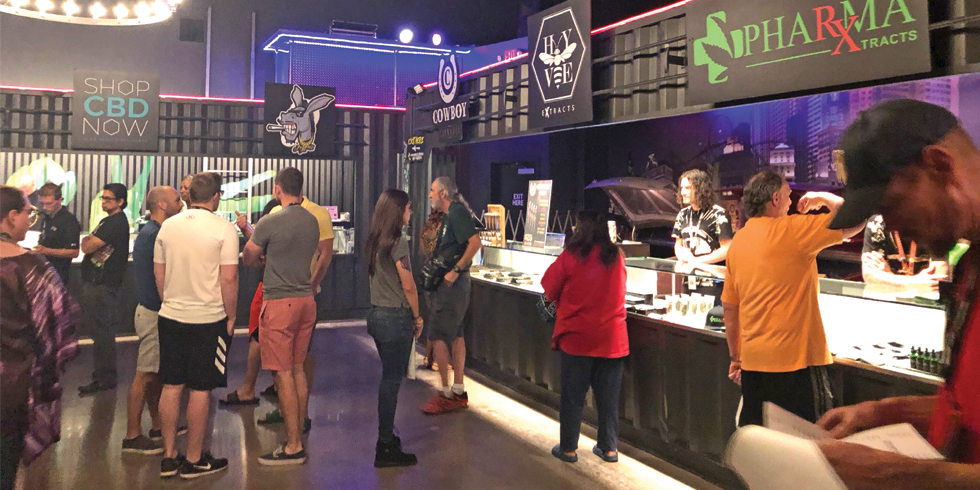
- Kelan Lyons
Pipedream
Weighing Utah's chances of legalizing recreational marijuana.
By Kelan Lyons
The '90s hip-hop can be heard in the bathrooms, lobby and cannabis museum at Acres Dispensary. It crescendos inside the narrow simulated drug tunnel, bouncing off the concrete walls until customers emerge in the Underground Marijuana Farmers Market, which bills itself as the only legal emporium of its kind in the country. A graffiti-tagged brick wall, decadent chandeliers and Cadillac trunks packed with marijuana bags fill out the 3,000-square-foot Las Vegas space.
Frequent customer Allyssa Sampson came to the market so she could pick up more vape pens. It's her fourth or fifth time in the clubby, art-filled marketplace. "All the people that grow, they're not just trying to grow it to sell it," she says of the artisanal marijuana growers—more artists than drug dealers—tinkering with strains so they can sell a better product. Sampson, who will soon move back to her home state of Georgia, is trying to enjoy the high-quality herb while she's still in Nevada. "I can still get it, just not as good of a quality," she says of the Peach State, where recreational marijuana is still illegal.
"This place is like a party," Michael Slider says, raising his voice above a rap song as he sits in the market's lounge section. Michael and his wife Karen live in Los Angeles, but they frequently visit recreational cannabis shops in Washington state and Nevada. "I'm in pain all the time," Karen says, explaining that she used to take opiates and painkillers for her back before she started smoking marijuana. "I take a couple hits, and I'm happy," she says.
Dispensaries have been selling recreational marijuana in Nevada since July 1, 2017. The Underground Marijuana Farmers Market opened, appropriately enough, this past April 20. Kevin Forde, director of marketing and sales at Acres, says pre-rolled joints, concentrates, vape cartridges and edibles are for sale, with vendors changing every week. There's even a museum that details public and governmental perceptions on cannabis and hemp throughout American history.
According to numbers provided by Forde, 113 people from the greater Salt Lake City area made the trek to Vegas between June and mid-July to check out the market.
Although mere miles from the Utah border, Nevada feels like it's a planet away. Farmers markets are ubiquitous here, but it's hard to imagine one solely dedicated to selling cannabis products. And yet, residents are just a few months from deciding whether Utah will offer medical cannabis to the sick and suffering, with two-thirds of voters in favor of the ballot initiative.
Given that medical cannabis is a very real possibility in Utah, could recreational marijuana ever exist here, too? Does the legalization of medical marijuana ever lead to recreational?
"It absolutely does," Andrew Jolly, president of the Nevada Dispensary Association, says. "Sometimes that transition is very quick, and other times it can take many years."
Nevada legalized medical marijuana in 2000, but didn't commercialize it until 2014, meaning people had to grow it in their homes until then. Utahns, meanwhile, are considering legalizing and commercializing medical cannabis at the same time, Jolly says, which could show citizens and legislators alike the benefits of broader legalization. "It shows people that the benefits of marijuana in general outweigh the negatives," he says. "People start to take note of the taxes generated from medical marijuana, they start to take note that opiate overdoses drop in states with medical marijuana, and people start to understand there isn't much of a difference between a medical marijuana patient and a recreational user, as people often assume."
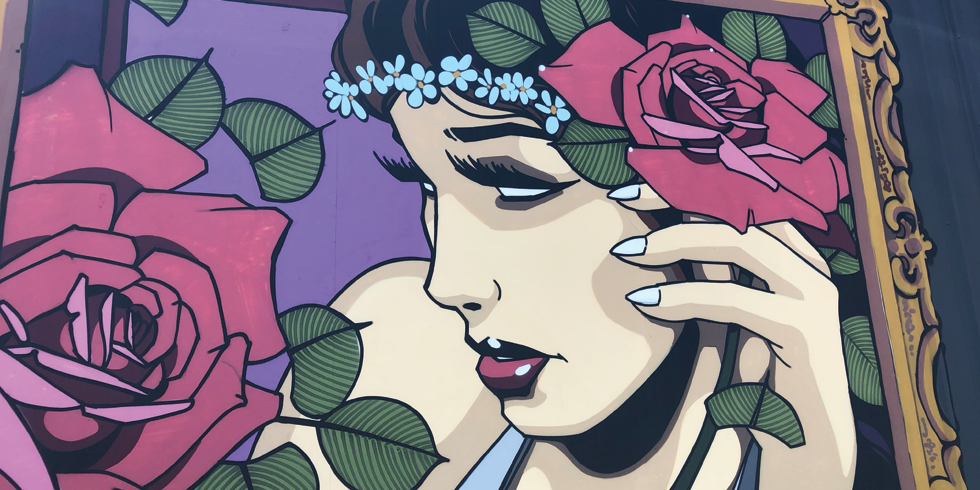
- Kelan Lyons
- Left: Inside the Underground Marijuana Farmers Market. Above: Art outside Las Vegas’ Acres Cannabis dispensary.
Forde says medical-marijuana legalization shows state agencies how financially lucrative it can be, which products sell and how the market reacts. This, he says, sets up states to be a little more comfortable with legalizing recreational cannabis.
In 2012, Washington state voters approved creating a regulated marketplace for legal cannabis. Medical marijuana had been legal prior to that, according to Aaron Pickus, spokesperson for the Washington CannaBusiness Association, but there was no real regulatory structure. Pickus says there were concerns statewide about a regulated system (recreational) operating alongside an unregulated one (medical), so in 2015 lawmakers passed legislation that combined medical marijuana under the same regulatory umbrella of the recreational marketplace.
Although medical technically came first in Washington state, Pickus says, it was the legalization of recreational that led to the regulatory framework that exists in both industries in the state today.
"I don't think that's the only path," Pickus says of the medical-to-recreational legalization trajectory. "I think it's really specific to each state."
Currently, nine states and Washington, D.C., have legalized recreational marijuana. But beforehand, each of those states first legalized its medical counterpart, and they all—except Vermont—have expanded to recreational cannabis through a ballot initiative, rather than through state legislatures.
Which brings us to The Church of Jesus Christ of Latter-day Saints. Back in August 1915, the church banned its members from using cannabis. Two months later, the state did the same, leaving some scholars to question whether the prohibitions were connected. Fast forward to October 2016, when the First Presidency sent letters to church members and leaders in Arizona, California and Nevada, asking them to oppose recreational marijuana. The letter states that the "dangers of marijuana to public health and safety are well documented," specifically mentioning potential harm to children's brain development and claiming that the accessibility of recreational marijuana is a "danger to children."
Matthew Burbank, associate professor in the Department of Political Science at the University of Utah, says this state is different from others because marijuana legalization has strong, organized opposition. Although he acknowledges the LDS church hasn't explicitly come out against the upcoming medical-cannabis ballot initiative—"We're opposed to this, but we don't want to come out and say we're opposed to this," Burbank says, rewording the church's April statement commending the Utah Medical Association for "cautioning that the proposed Utah marijuana initiative would compromise the health and safety of Utah communities"—Burbank suggests the reason why state lawmakers haven't already passed medical cannabis legislation is because, "these people looked at the signals the LDS church was sending, and said, 'We're not really interested in this at all. This is not something we want to see happen.'"
That said, Burbank is surprised by a recent Salt Lake Tribune-Hinckley Institute of Politics poll in which 61 percent of respondents said the LDS church's stance on the medical cannabis initiative makes no difference in their viewpoint.
Burbank says a perceived path from medical to recreational marijuana seems to be what opponents of the initiative are afraid of and are organizing against. (A proponent of the initiative has said the idea of medical cannabis leading to recreational marijuana "has no basis in truth.") It's possible that November's ballot initiative could lead at some point to one for recreational marijuana, Burbank says, but he doesn't see it as a likely path because of how hard it is to get an initiative on the ballot and because he thinks Utahns aren't likely to be as supportive of recreational legalization as they are of medical.
"I mean, if people really want to do this," he adds, "we're right next to Las Vegas."
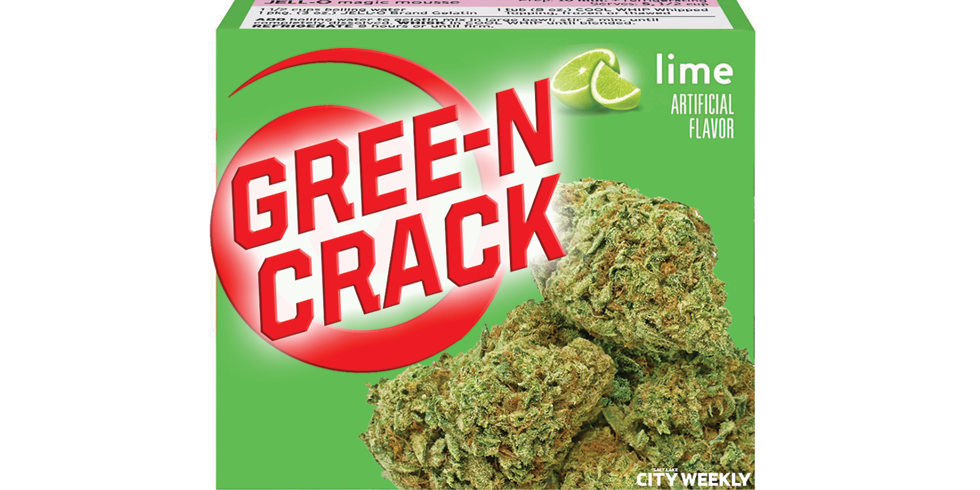
- Derek Carlisle
The Strain Game
Our readers dub some potential homegrown nugs.
February 2018 was a simpler time (not really), but smack in the middle of the 63rd state Legislature and with ever-increasing buzz (bud?) that this was medical cannabis’ year, we asked our readers to come up with names for Utah-centric marijuana strains. Your answers had us all in stitches (which we promptly treated with some high-octane opioids). Here are some of our faves:
Trax Wax.
Nick McConochie
Via Facebook
Reffer Society.
Cindy McBride Gibbs
Via Facebook
Funeral POTatoes *cue drums*
Mitch Bragg
Via Facebook
Great Salt Bake.
@thischarmingmum
Via Instagram
High Sauce!
Ronette Nelson Knight
Via Facebook
Latter-day Strains (but that’s more of a brand name it would have to have sub strains to make any sense).
Simon Harwood
Via Facebook
Diet Coke Smoke.
Pix801
Via Instagram
Federal Highs.
William Boyd
Via Twitter
The other green casserole with crunchy stuff.
Rob Rodgers
Via Facebook
Seagull Diesel, Provo Gold, Kolob Kush.
Gililland Daymon
Via Facebook
Es-cush-lante.
@sweet_clarity
Via Instagram
The Real Housewives of Salt Lake Hash.
Megan Hansen
Via Facebook
Prophet’s Private Stash, Temple Hemple, Holy Toke. High-n-Zion.
Alan Peterson
Via Facebook
Bee-high State, Porter Smokewell, Modab.
@badonkeyrocks
Via Instagram
Seer Stoned.
Jon Allen
Via Twitter
Ta-BURN-acle.
Ashley Jones
Via Facebook
Joseph Spliff, Temple Recommend, Bonneville Blunt.
Dustin Dabb
Via Facebook
City-Creek Creeker.
David Butler
Via Facebook
Zion Curtain 3.2.
Kelly O’Hara
Via Facebook
Capitol Reefer, Foot Lucid, Latter-day Dank, Jon Bluntsman Jr., Greatest Grow on Earth, Multi-level Marijuana, Doobie a Favor and Use Your Turn Signal.
Julie Radle
Via Facebook
Inversion Therapy.
Regie Thompson
Via Facebook
Never-gonna-happen High.
Kerry Knowles
Via Facebook
Smog.
Sarahjane Aleta
Morrison
Via Facebook
“God’s Will.”
Clinton Reid
Via Facebook
Elder Dankerson.
Rob Rodgers
Via Facebook
As long as it’s legal, who cares?
Scott Meade
Via Facebook









